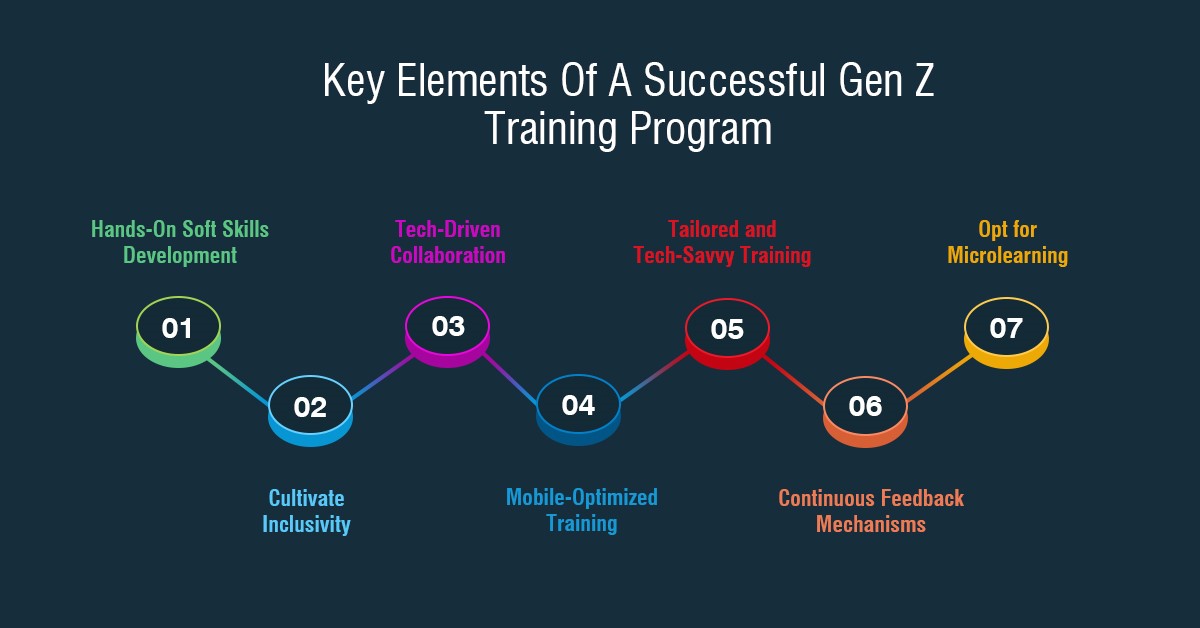A Roadmap for Training and Unlocking Gen Z's Potential in Workforce
January 11, 2024

Comprising approximately 27% of the workforce, a new wave is stepping in—youthful, energetic, and inexperienced yet quirky—bringing with them a fresh perspective in the hybrid workplace.
Meet Generation Z—born between 1997 and 2012—these meme-sharing, vibe-loving individuals have embarked on their careers, signaling the need for a tailored approach to meet their unique needs and preferences.
With over sixty million members of Gen Z on the brink of entering the workforce in the next few years, the question arises: Are your organizations ready to combat the seismic shift in work habits? If not, here are some insights that might be beneficial.
Understanding Gen Z in the Workplace
Engaging and understanding the digitally native Gen Z in the workforce requires organizations to drop off traditional approaches and welcome unconventional strategies to create a dynamic and inclusive work environment for this generation.
Here’s what Gen Z looks for in a workspace and their job—
-
Purposeful Work
Based on a 2022 Lever report, 42% of Gen Z prioritize working for a company whose values and purpose align with their own, even over a higher paycheck. While fair compensation is crucial, they seek roles that make a meaningful impact in their respective fields.
-
Flexible Work Arrangements
The American Psychological Association notes that Gen Z, especially its older members, faces heightened stress levels compared to other generations. In their job search, they are drawn to employers prioritizing physical and mental well-being, often favoring those offering hybrid work arrangements. This emphasizes the significance of flexibility in the workplace to accommodate the unique needs of Gen Z.
-
Cultivate Virtual Culture
Fostering a virtual culture, especially for Gen Z employees. Managers can facilitate firsthand cultural experiences through connections with role models and involvement in projects that reflect the organization's values and align with employee interests.
-
Emphasis on Diversity and Inclusion
As per a Pew Research study, Gen Z stands out as the most ethnically and racially diverse generation in the U.S. They actively seek out workplaces where leadership and teams reflect a diverse range of political, intellectual, and cultural perspectives.
-
Perfect Work-Life Balance
Gen Z places a significant emphasis on work-life balance, with 38% ranking it as a top priority when selecting an employer. Although slightly lower than the 47% of Millennials, it still surpasses the priorities of previous generations. To be an appealing choice for these individuals in the era of hybrid work, employers should proactively address and mitigate workplace burnout.
Training Gen Z in the Modern Workplace
Gen Z craves interactive, personalized learning experiences and a hybrid work environment that aligns with their on-the-go lifestyle. Let’s walk through the key elements to consider when building a successful Gen Z training program:

-
Hands-On Soft Skills Development: Provide practical learning experiences, allowing them to shadow experienced professionals and practice skills with peers to enhance soft skills crucial for collaboration.
-
Cultivate Inclusivity: Foster an inclusive training environment in the workforce where Gen Z can interact comfortably with more experienced colleagues, accelerating their integration into the organization.
-
Tech-Driven Collaboration: Leverage technology, including psychometric-based tools, to overcome the challenges of training geographically dispersed Gen Z employees and enhance team dynamics.
-
Mobile-Optimized Training: With 98% of Gen Z owning smartphones, prioritize mobile-first design for training. Trim content, ensure relevance, maintain clarity, simplify navigation, and employ microlearning strategies to engage and effectively train this tech-savvy generation.
-
Tailored and Tech-Savvy Training: Develop personalized training programs, embracing online learning platforms and AI, to cater to Gen Z's diverse learning preferences, ensuring impactful contributions to the business.
-
Continuous Feedback Mechanisms Generation Z demands regular, trackable feedback. Unlike traditional annual reviews, most of this generation seeks frequent check-ins. Managers must prepare for this shift, delivering measurable insights through technology portals for effective and timely learning.
-
Opt for Microlearning: To captivate their attention, utilize microlearning. Deliver concise, quick bites of information that align with their need for instant knowledge and accommodate shorter attention spans shaped by constant digital engagement.
Navigating the Future with Gen Z in the Workplace
Constructing a diverse workforce resembles assembling a puzzle, where each demographic contributes to the larger picture. Navigating these challenges with Gen Z requires recognizing their preferences and challenges—
-
Gen Z prefers electronic communication due to 24/7 internet access.
-
Exhibits have shorter attention spans.
-
Values workplace autonomy and independence.
To engage employees of this generation effectively, leaders must acknowledge their unique characteristics and foster a work environment that values independence and autonomy. The objective extends beyond adapting to Gen Z's preferences. It involves transforming organizations into a growth-focused hub, focusing on talent retention, sustained profitability, and engaging the current workforce.
Tools like psychometric testing and AI serve as invaluable guides, aiding in comprehending diverse learning styles and facilitating a customized training approach for Gen Z.
End Note
While training Gen Z employees, you must realize that there is no one-size-fits-all strategy. Not just Gen Z, training any generation poses challenges, and by embracing these challenges, you can yield substantial benefits for your entire workforce and the company's growth. Tailoring training to Gen Z's needs not only engages them but positions your organization to thrive as a workplace of the future.

